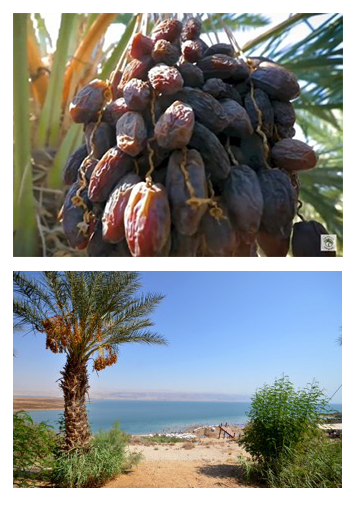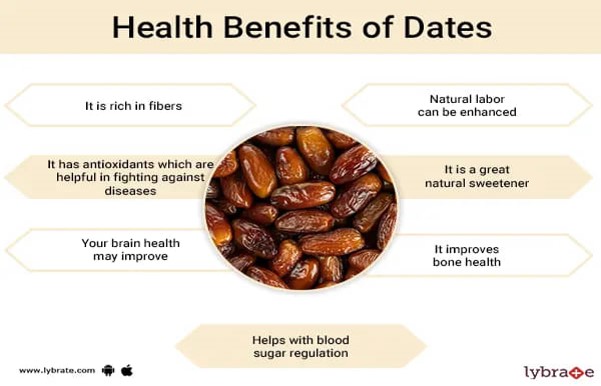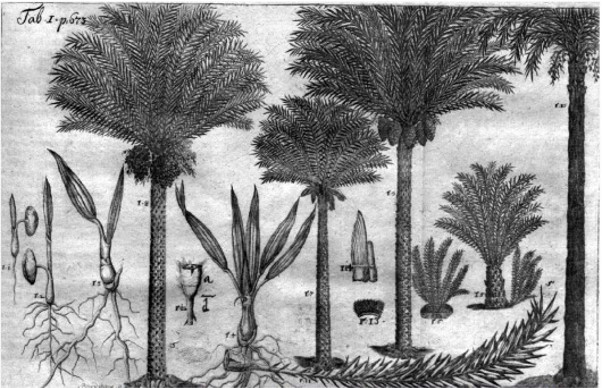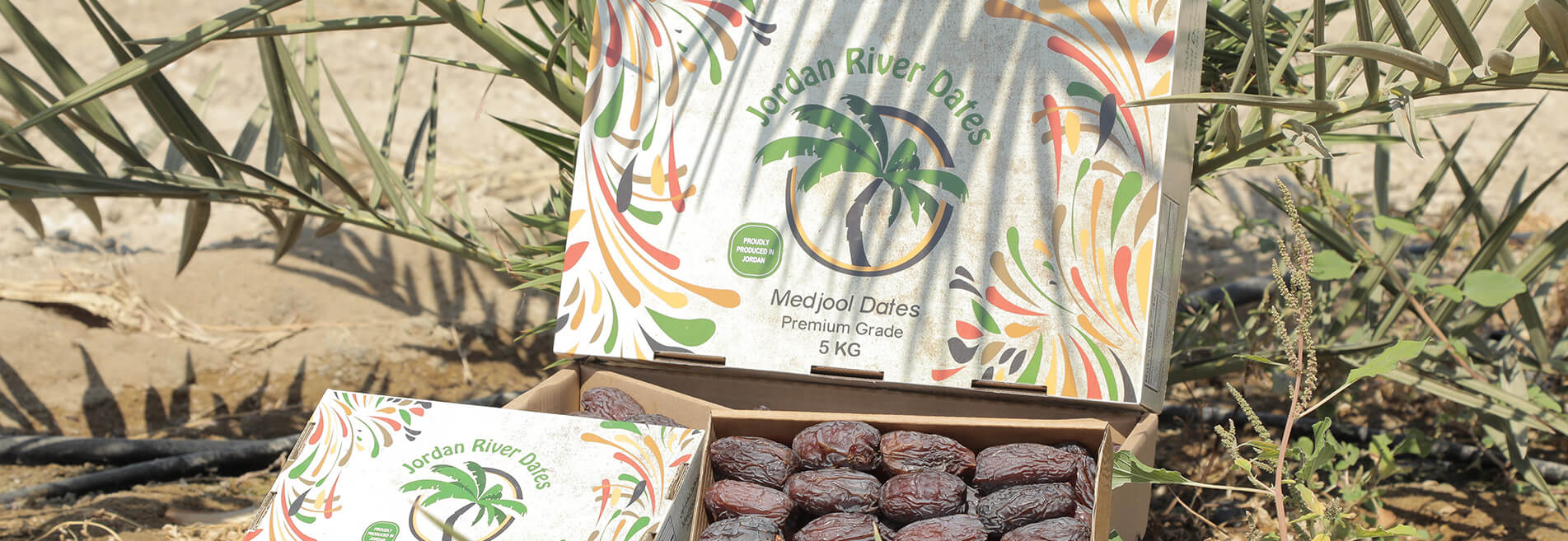Our Products are Medjool & Barhi dates grown on Jordan River bed with a unique taste, texture and coloured.
Our trees are hand pollinated and the harvest is delicately hand-picked with utmost precision.
All products are pesticide free, 100% Natural with no preservatives or food additives, and are
NON- GMO certifed.
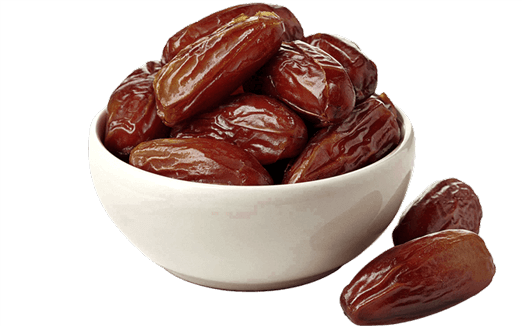
The Medjool is naturally a sweet fleshy type of semi dry dates and is considered to be the King of all dates. Dates are seasonal fruits that are cultivated at the end of the summer season; therefore, the supply of the fresh, plump, and juicy dates is limited, whereas the semi dried dates, so called “تمر” in Arabic, or “Tumer” in English are available throughout the year.
Medjool Dates is an oval- semi cylindrical shaped fruit, with medium to dark brown color, and a length that ranges between 3-6 centimeters, a diameter that ranges between 2-3 centimeters, and a moisture content that ranges between 17% to 25 %.
Our Medjool dates are classified or graded into premium, delight, classic and standard according to their skin separation, in addition each class is sorted in accordance to 5 different weights.
click here for the details of the specifications.
For the nutritional value of Medjool dates, please click here.
Barhi dates are usually consumed fresh; they are packed in strands or branches in 5 KG cartoon boxes. They are seasonal fruits that are harvested during August and September. They can stay fresh few weeks if stored at cool Temp.
- Product Specification:
- No Mold
- No Broken Skin.
- No Puffed Skin.
- No Blemishes.
- No Insecticides Residue.
- Product Description:
- Type: Fruits
- Color: Light to Dark Brown.
- Taste: Sweet.
- 100 % Chemical Free.
- Non- GMO Verified.
- 100 % Natural.
- No Sugar.
- No Additives.
- Physical attributes:
- Shape: Oval- Semi Cylindrical Shape.
- Fruit Length: 3-7 cm.
- Fruit Diameter: 2-3 cm
- Moisture content :17 to 25%
- Features:
- Refreshing taste.
- Excellent flavor.
Soft, Rich, & Flesh
| Size | Weight Range/Pc | Avg. Weight/Pc | QTY/KG |
|---|---|---|---|
| Super Jumbo | 25 gm & Larger | 25 gm | 40 pcs /KG |
| Jumbo | 22-24 gm | 22 gm | 46 pcs /KG |
| Large | 17-21 gm | 19 gm | 53 pcs /KG |
| Medium | 14-16 gm | 15 gm | 67 pcs /KG |
| Small | 13 gm & smaller | 13 gm | 77 pcs /KG |
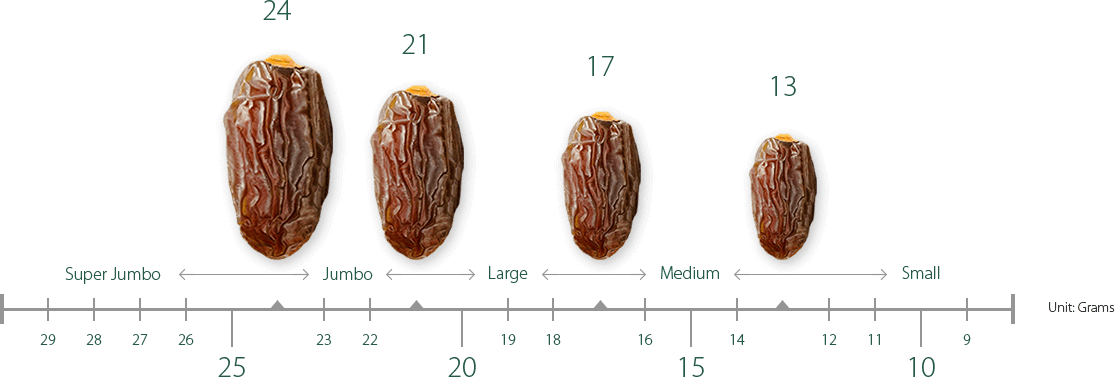

Soft, Rich, & Flesh
| Size | Weight Range/Pc | Avg. Weight/Pc | QTY/KG |
|---|---|---|---|
| Super Jumbo | 25 gm & Larger | 25 gm | 40 pcs /KG |
| Jumbo | 22-24 gm | 22 gm | 46 pcs /KG |
| Large | 17-21 gm | 19 gm | 53 pcs /KG |
| Medium | 14-16 gm | 15 gm | 67 pcs /KG |
| Small | 13 gm & smaller | 13 gm | 77 pcs /KG |
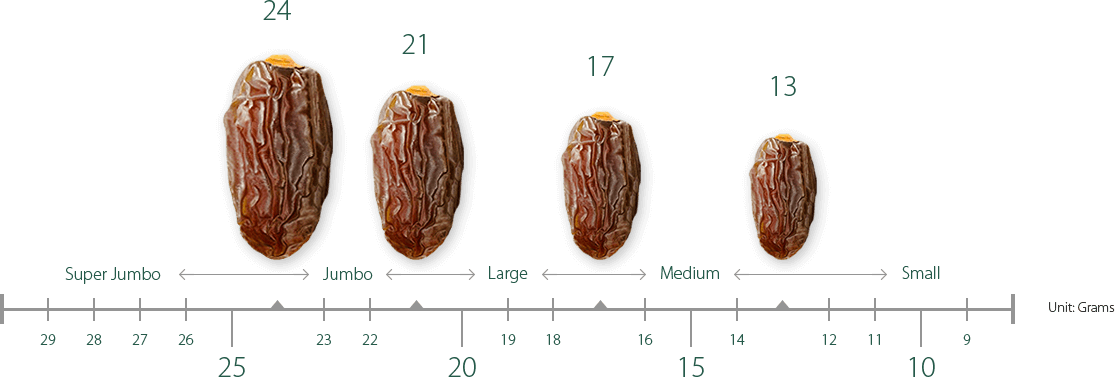
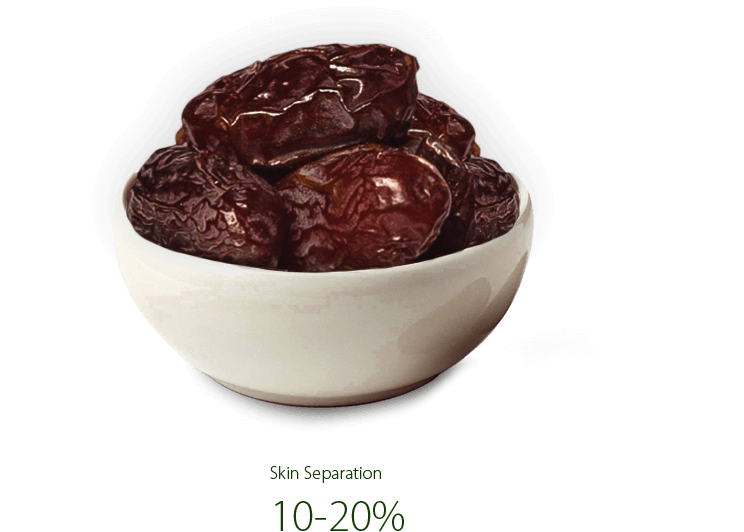
Soft, Rich, & Flesh
| Size | Weight Range/Pc | Avg. Weight/Pc | QTY/KG |
|---|---|---|---|
| Jumbo | N/A | more than 18 gm / Piece | 56 pcs /KG |
| Large | N/A | less than 17 gm / Piece | 62 pcs /KG |
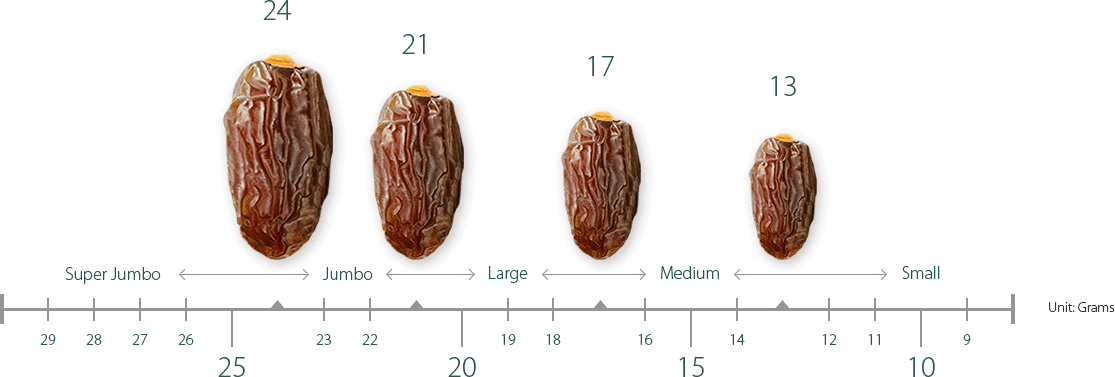
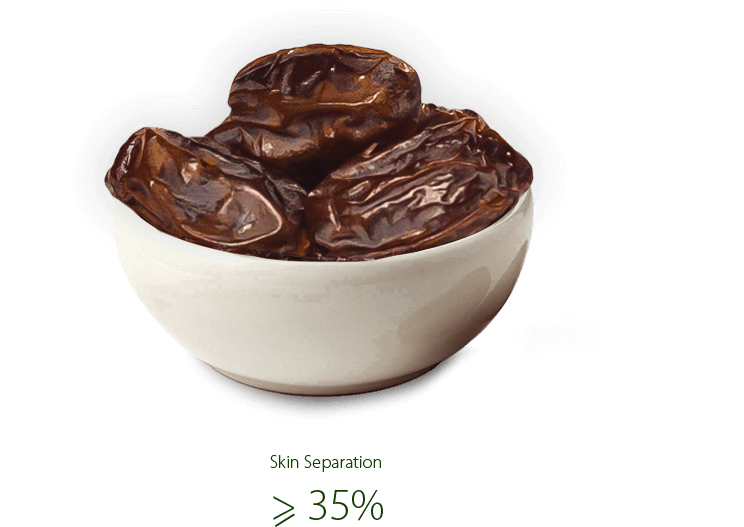
Soft, Rich, & Flesh
| Size | Weight Range/Pc | Avg. Weight/Pc | QTY/KG |
|---|---|---|---|
| Super Jumbo | 25 gm & Larger | 25 gm | 40 pcs /KG |
| Jumbo | 22-24 gm | 23 gm | 45 pcs /KG |
| Large | 17-21 gm | 19 gm | 53 pcs /KG |
| Medium | 14-16 gm | 15 gm | 67 pcs /KG |
| Small | 13 gm & smaller | 12 gm | 80 pcs /KG |
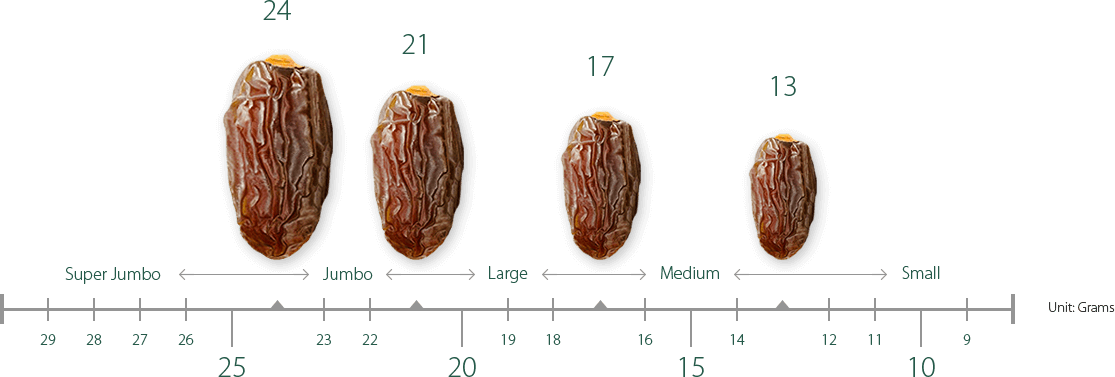
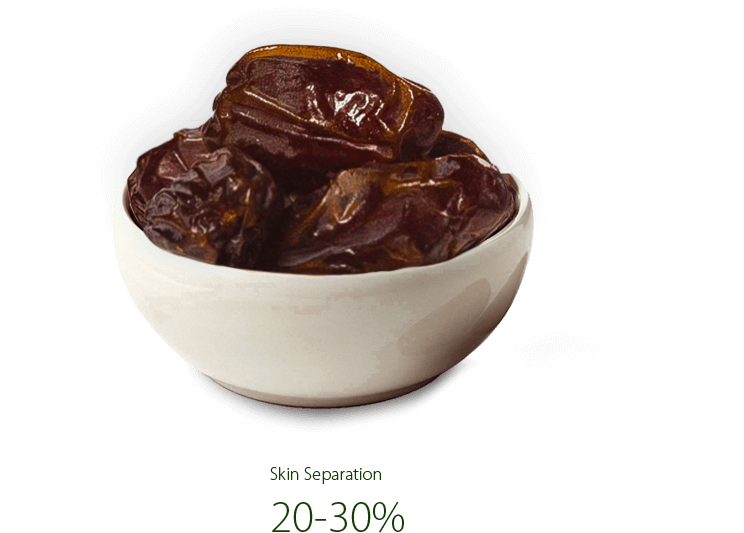
| Vitamins & Minerals | RDA* | Dates | Vitamins & Minerals | RDA* | Dates | Amount Per 100G | % Daily Value* |
|---|---|---|---|---|---|---|---|
| Vitamin A IU | 900 pg | 149 pg | Copper | 0.9 mg | 0.36 mg | Total Fat 0.2g | 19% |
| Thiamin B1 | 1.2 mg | 0.05 mg | Iron | 18 mg | 0.9 mg | Total carbohydrate 75 g | 25% |
| Riboflavin B2 | 1.3 mg | 0.06 mg | Magnesium | 420 mg | 54 mg | Dietary fiber 7 g | 28% |
| Niacin B3 | 16 mg | 1.61 mg | Manganese | 2.4 mg | 0.29 mg | Sugar 66g | |
| Vitamin B6 | 1.7 mg | 0.24 mg | Phosphorus | 1250 mg | 62 mg | Protein 1.8 g | 3% |
| Vitamin C | 90mg | 0 mg | Potassium | 4700 mg | 696 mg | Vitamin A | 2% |
| Folic Acid | 400 mg | 0 mg | Zinc | 11 mg | 0.44 mg | Calcium | 6% |
| Calcium | 1000 mg | 64 mg | Sodium | 2400 mg | 1 mg | Vitamin 86 | 10% |
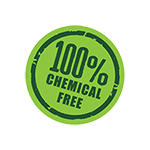

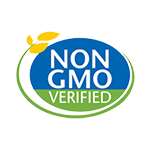


Nurseries
We have state of the art nursing facilities at the Jordan Valley. These facilities are equipped with climate control green houses, where we acclimatize and grow our Palm Dates Tissue Culture in preparation for planting in our fields or selling to end users ready to be planted at the field.
“White Sand Palm Dates Farms” is the sole and exclusive distributor of French Origin & British Origin – Palm Date Tissue Culture such as Medjool, Barhi, Khalas… etc.
The scientific name of the date palm, Phoenix dactylifera, has roots in ancient Greece. The coastal region between the Jordan Valley and the Mediterranean Sea, known as Phoenicia, derives its name from the Greek word for purple land, referencing the purple dye made from sea snails that brought the area fame.
The date palm grew abundantly in Phoenicia, leading to the belief that it was native to the region.
As a result, the tree became known as Phoenix, or the tree of Phoenicia, and was a symbol of the area, even appearing on Phoenician coins. The term "dactylifera" translates to "finger bearing," a nod to the oblong-shaped dates and the clusters in which they grow.
Medjool Dates
Dates are one of the oldest known crops cultivated as a food source for humans, with evidence of their farming dating back to 7000 B.C. Of the more than 3,000 date varieties available worldwide, the Medjool is considered the “king of dates” due to its succulence and rich taste qualities, historically making it a delicacy reserved for royals. The palms on which the fruit grew were also used by kings as a symbol of victory.
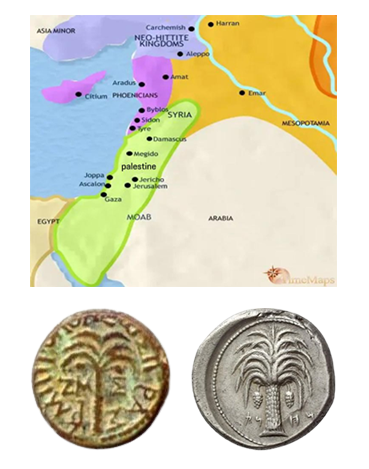
Medjool Nutritional Value
Full of natural sugars, primarily glucose and fructose, Medjool dates are a healthy and highly energizing snack with a juicy, fleshy, and chewy texture.
They are an excellent source of fibre, contain more potassium than bananas, and are rich in protein, magnesium, vitamin B complex, and other essential minerals.
Jordanian Medjool Quality
The Jordan Valley is renowned as the best place in the world for cultivating high-quality Medjool dates due to its exceptionally high temperatures, low humidity, and minimal rainfall. Situated 390 meters below sea level, it is the lowest point on earth and has air enriched with the highest levels of oxygen. Its year-round climate and fertile soils make it an important location for successful and sustainable agriculture. While there have been attempts to cultivate Medjool date palms in different parts of the world, they have not yet achieved the special quality and taste criteria that make Jordanian Medjool dates so highly favoured.
